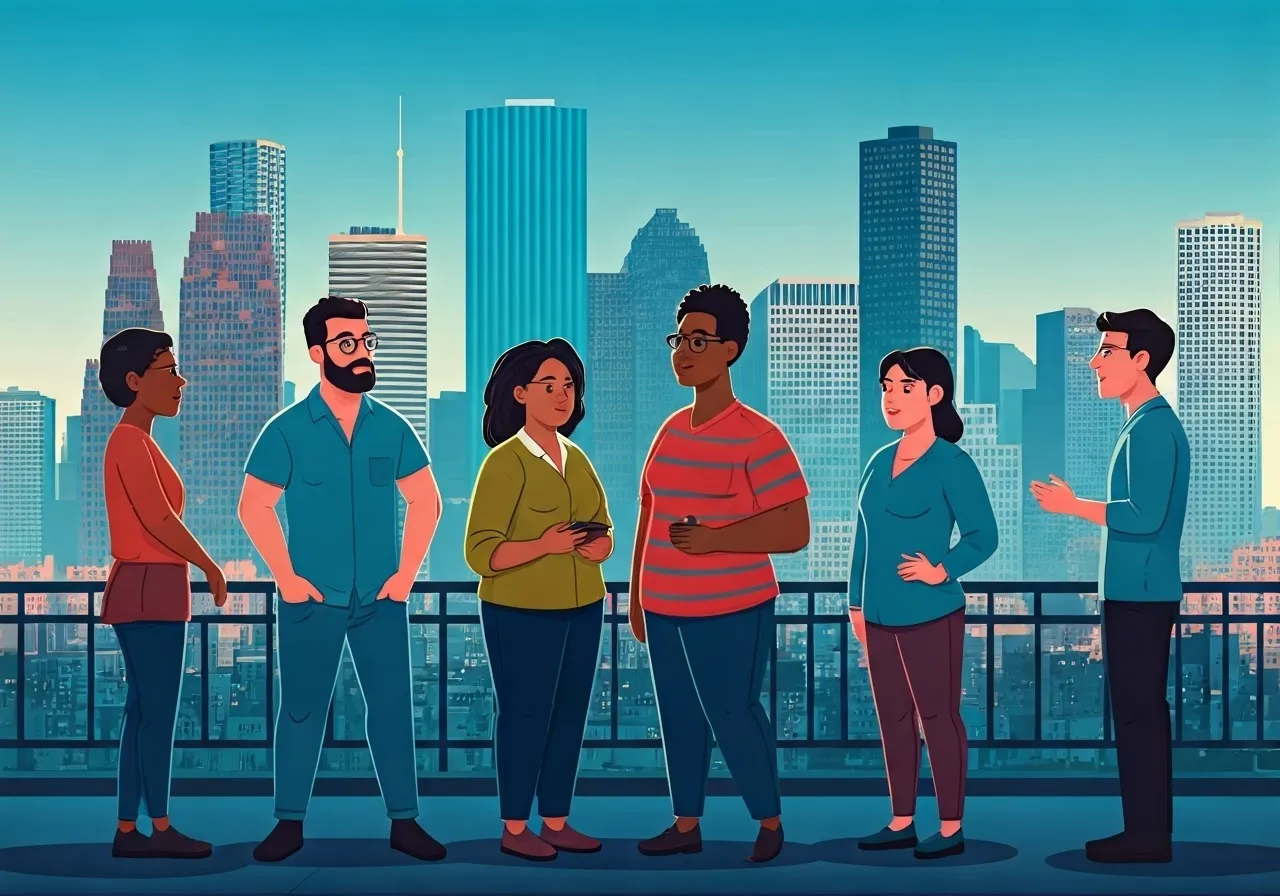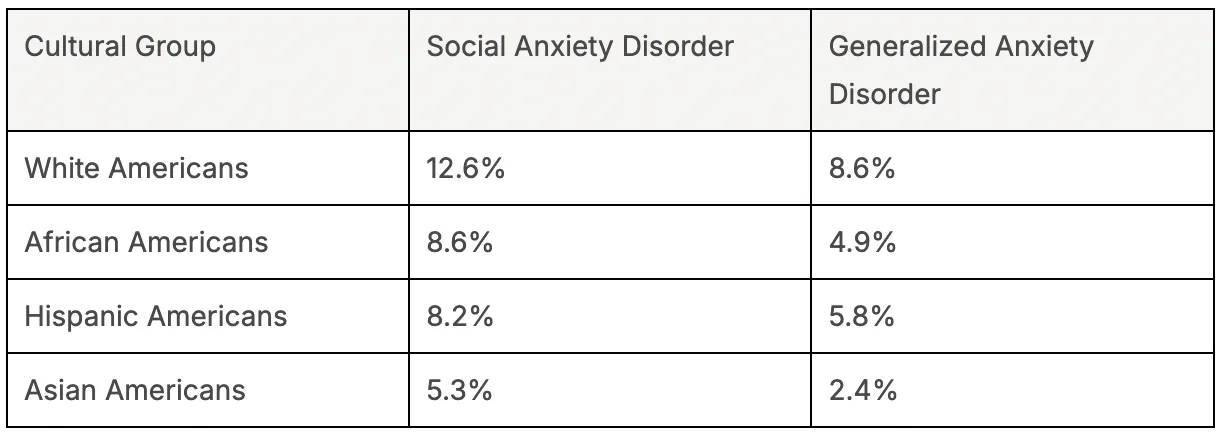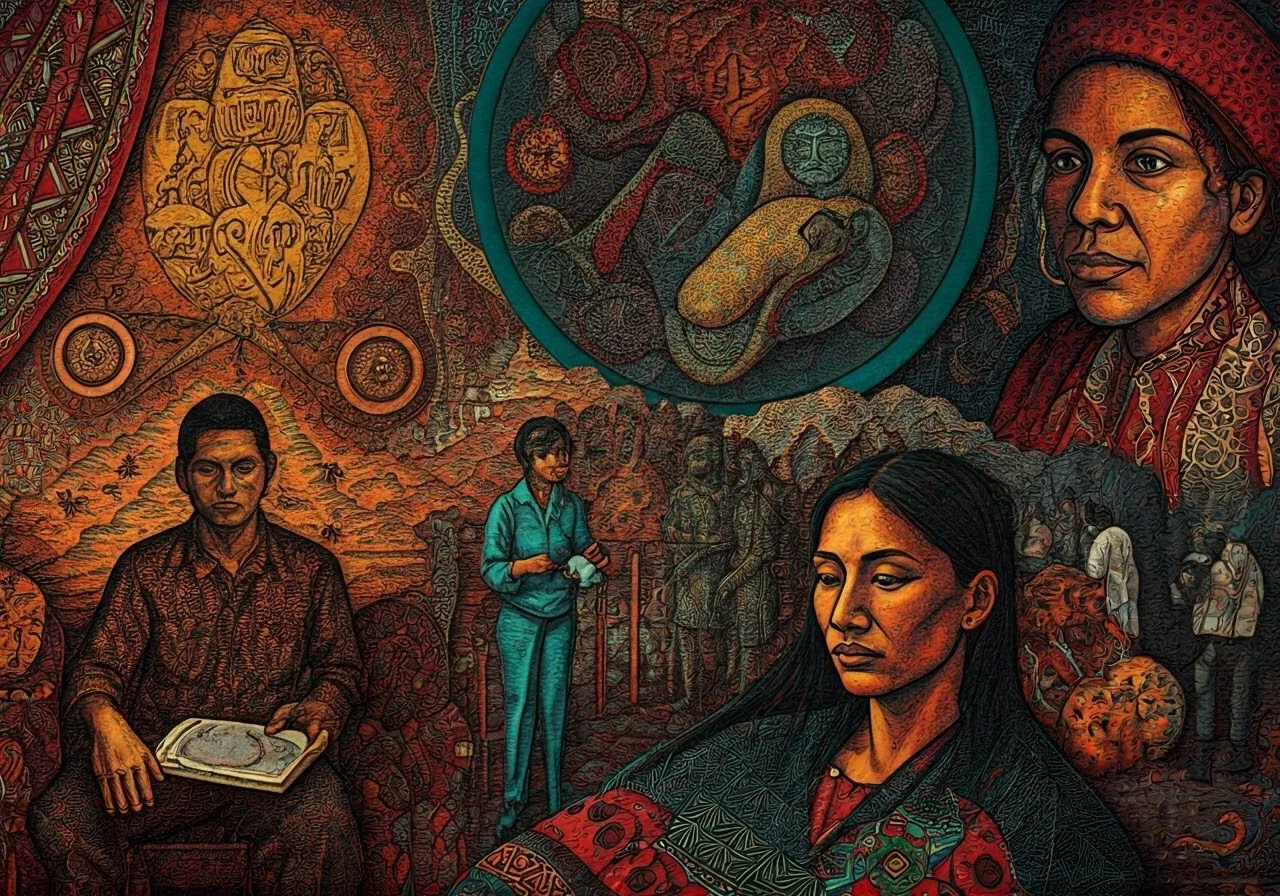Cultural factors are important in how people feel and show anxiety symptoms. Paying close attention to these factors helps us see the many ways anxiety shows up in different cultures. This blog post study seeks to improve our understanding of how cultural norms, beliefs, and practices affect mental health, especially related to anxiety. It is important to recognize these influences so we can provide mental health support that respects different cultures and is effective.

The cultural diversity in Houston helps us understand social anxiety better. Different cultures affect how people see and react to social situations. Things like cultural norms about social interactions, ways of communicating, and showing emotions can change how social anxiety is felt in Houston's many communities.
To really understand this, we need to be sensitive to these cultural differences. By recognizing how culture influences experiences of social anxiety, we can create an environment that is more inclusive. This environment can better support the mental health needs of all people living in Houston.
Cultural diversity plays a big role in how people understand and show mental disorders like anxiety, including delusional disorders. Cultural influences not only change how anxiety symptoms are seen and understood but also affect how people look for help and deal with treatment. The beliefs and different cultural norms in different collectivistic cultures about mental illness, such as the fear of a deformed body, can create stigma around anxiety, which impacts how individuals seek help.
For example, some cultures focus more on the physical signs of distress. This means people might pay more attention to their physical symptoms instead of the psychological side of anxiety. Mental health professionals need to understand these cultural influences. This understanding helps them offer care that fits individual beliefs and values.
By recognizing and addressing cultural influences on anxiety, we can provide better mental health services. These services can be more welcoming and suited to the special needs of different groups.
Examining anxiety trends across multicultural communities reveals variations in prevalence rates among different cultural groups, influenced by factors such as gender schema. While direct comparisons are complex due to methodological challenges and cultural differences in symptom expression and help-seeking, analyzing trends within multicultural settings like Houston can provide valuable insights across a wide range of issues.
Research suggests that cultural factors and aspects of Chinese culture in epidemiological studies contribute to differences in the prevalence and risk factors related to the presentation of anxiety disorders. For example, a study published in Current Psychiatry Reports found lower prevalence rates of certain anxiety disorders among Asian Americans compared to other ethnic groups in the United States.


Cultural beliefs and norms play a big role in how people see and deal with mental health issues, like anxiety. In some cultures, people may think that mental health problems come from spiritual factors, personal conflicts, or body imbalances. These views affect how comfortable individuals feel about getting professional help and how families and communities understand anxiety.
It's important to recognize and respect different cultural views on mental health. This helps reduce stigma and encourages people to seek help. Being culturally sensitive is essential for giving effective mental health support that fits with a person's beliefs and values.
The views on mental illness, like anxiety, differ a lot between cultures. These differences can affect how open people are about their mental health issues and their willingness to get help. In some cultures, mental illness is seen negatively. This can make people feel ashamed, hidden, and less likely to use mental health services.
Social norms also affect how people with anxiety are seen and treated in their communities. For example, if someone shows anxiety that does not match what is expected in their culture, they might face judgment or a lack of understanding. This can add to the stigma and make it harder for them to ask for help.
To reduce stigma, we need to take several steps. We should raise awareness, improve understanding of mental health, and challenge harmful views about mental illness. It is important to break these barriers. Doing this will help create a more accepting and supportive space for those dealing with anxiety and other mental health issues.
Houston has many different people, so there are various ways to treat mental health. This shows a mix of old and new practices. Many cultural groups use traditional healing methods. For example, Traditional Chinese Medicine focuses on restoring balance in the body and mind. This can include things like herbal remedies, acupuncture, or mindfulness techniques.
Western cultures mostly use therapy and medication for mental health treatment. But more people are starting to see the benefits of combining traditional methods with modern ones. Using approaches that fit cultural backgrounds can make treatment more effective and people more engaged, especially for those from different cultures.
Still, it’s important to carefully blend traditional and modern methods. Health care providers and patients need to work together. They should understand the cultural views and preferences of treatment. This is key for giving care that is complete and focused on the patient, while also respecting their beliefs.
Family dynamics connect closely with cultural values and interpersonal relationships. They play a big role in how people experience anxiety. Expectations about family roles, how we communicate, and how we show emotions can influence how people see and deal with anxiety. For example, in cultures that focus on togetherness, people with social anxiety disorder might feel more pressure to fit in with what is expected.
It is important to understand how family dynamics and cultural values work together. This understanding helps in creating interventions that are sensitive to the culture. These interventions can better meet the needs of individuals and families dealing with anxiety in their own cultural settings.
Cultural expectations within families can affect how people experience social phobia. These expectations might involve doing well in school, choosing a certain job, or following social norms. If people feel they cannot meet these expectations, their anxiety in social situations can grow.
Also, the kind of family structure can influence how social phobia develops and shows itself. Some cultures have large, close families, while others may focus on smaller and more independent units. These family styles can change how individuals interact socially and their comfort in different social settings related to social behaviors.
To help with social phobia in the family context, it's important to respect these cultural values and expectations. Mental health professionals can assist both individuals and families in recognizing how cultural influences play a part. They can also help develop coping strategies that fit with their cultural beliefs.
Strong support systems are very important for managing anxiety symptoms. Cultural factors shape the type and availability of these support systems. In collectivist cultures, families often provide key support to the social group. People usually turn to family for emotional help, advice, and practical support when facing anxiety.
Religious ties can also help greatly. Faith communities can be a source of comfort and ways to cope. In some cultures, getting help from religious leaders or taking part in religious practices is an important part of managing anxiety symptoms.
For mental health professionals, understanding the cultural context of support systems is vital, as these networks can serve different purposes. By recognizing and using these existing support networks in treatment plans, they can improve support and get better results for their clients.
Cultural competence is very important for mental health professionals in Texas because it is a state with many cultures. These professionals need to be aware and sensitive to different cultures to meet their patients' needs well. They should understand various beliefs about mental health, different ways of communicating, and how culture can affect anxiety.
Offering care that understands these cultural differences takes constant learning. Mental health professionals should commit to respecting and recognizing individual differences. Training programs that focus on cultural competence are essential. They help professionals gain the skills and knowledge they need to provide better care.
Delivering mental health services that are sensitive to culture comes with special challenges. Language barriers can make it hard for patients and providers to communicate well. To fix this, we need access to good interpreters and materials that match different cultures. This helps make sure the information shared is clear and correct.
Also, not knowing about cultural differences and the various ways people show anxiety can result in wrong diagnoses or treatments that don't work. Mental health professionals need to learn more about different cultures and create approaches that relate to what their patients have experienced in life.
To deal with these challenges, we need a well-rounded plan. This includes having more diversity in the mental health workforce, regular training for cultural skills, and teamwork with community leaders and organizations that represent different cultural groups.
Mental health professionals in Houston can use some great methods to give better care that respects different cultures. They should listen to patients and acknowledge their cultural beliefs and experiences. It's also important to use language and communication that fits with these cultures. Doing careful assessments that include cultural factors affecting anxiety is key.
Another good method is to work together with patients to make treatment plans that match their cultural values and preferences. This might mean including traditional healing methods or getting family members involved in treatment when it makes sense.
By following these methods, mental health professionals can build a friendly and respectful space. This helps build trust, reduces stigma, and encourages people from various cultural backgrounds to take an active role in their mental health journey.

Community and religious support networks are important resources for people facing mental health challenges. They help us understand their value through a cultural view. Many cultures see these networks as key to feeling well. They bring a sense of belonging, shared values, and ways to cope based on cultural traditions.
Religious groups, especially, provide strength, guidance, and spiritual support. It is important to recognize how these cultural institutions help boost mental health. This is essential for creating strong support systems that meet the needs of different communities.
Community centers play an important role in providing mental health support, especially in diverse cultural communities. These centers help people access mental health services and meet the specific needs of different cultural groups. It is very important to think about cultural factors when creating programs and services at community centers. This will help make sure they are relevant and effective.
For example, community centers can have support groups that are designed for specific cultures. They can also hold workshops to educate people about mental health and run outreach programs that connect with the community in a way that respects their culture. Furthermore, they can link individuals with mental health professionals who understand their cultural background or who are trained to provide care in a culturally sensitive way.
By recognizing cultural factors and working with community leaders, centers can create friendly spaces. These spaces promote mental well-being and help reduce the stigma around mental health issues in various cultural groups.
Religious and spiritual ways can help people deal with anxiety. They use faith, rituals, and community support. For many, beliefs give a way to understand and handle tough times, including anxiety. Activities like prayer, meditation, and religious rituals can create a feeling of peace, hope, and a connection to something bigger.
Faith groups often provide social support, helping people feel like they belong and giving them a chance to share their feelings. Talking to religious leaders or mentors can offer comfort, useful advice, and ways to cope with anxiety.
Mental health professionals can notice and include these spiritual ways into treatment plans. Talking about religious and spiritual beliefs with patients can help build understanding and strengthen the connection, leading to care that is more complete and sensitive to different cultures.
Educational systems can raise anxiety in young people. In individualistic societies, including South America and the Pacific Islands, they face academic stress and high expectations that are often linked to life satisfaction. Cultural factors also impact this. Different cultures have different focuses on how important academic success, competition, and future opportunities are.
To help reduce youth anxiety, schools can promote mental health awareness. They can offer counseling services and create supportive learning spaces. These environments should value both emotional health and academic success.
Cultural pressure has a big impact on academic expectations. It can cause social anxiety in young people. In many cultures, doing well in school is very important. It is often linked to social status and future job chances. This pressure can lead to fierce competition and a fear of failing. For some students, this makes socializing at school very stressful.
Also, different cultures have different views on expressing emotions. In cultures where it is not common to talk about mental health, students may be afraid to ask for help or share their worries. This can make them feel even more alone and anxious.
Schools can help ease these pressures by focusing on the overall health of students. They can create a supportive environment. Schools should provide access to mental health services and work on reducing academic stress. By promoting healthy ways to cope, schools can improve students' well-being.
Many schools are starting programs to help students' mental health. They know that anxiety is becoming more common among young people. These programs can include peer support groups, mindfulness workshops, and campaigns to inform people about mental health.
Schools can also add lessons about mental health to their classes. They can teach students about anxiety, what it feels like, and how to deal with it in a healthy way. When students learn these important things, they can ask for help when they need it. This makes the school a better place for everyone.
It’s important for schools to work with parents, families, and community groups. This helps build a strong support system for students. When everyone works together, they can tackle the many issues that affect young people's mental health. This way, they can promote a healthy and positive environment that goes beyond just school.
Workplace culture is very important in either increasing or reducing stress and anxiety at work. Cultures that focus on balancing work and life, open conversations, and taking care of employees usually create more supportive environments. This helps to lower anxiety.
On the other hand, workplaces that have high demands, little freedom, and unclear work-life boundaries can harm employee mental health. This may lead to more stress, burnout, and anxiety issues. It is essential to have mental health awareness at work to build a supportive environment for employees.
Navigating the demands of work can be hard for people with social phobia symptoms. Moments like performance reviews, presentations, or networking events may cause anxiety. This fear of negative evaluation can hurt job satisfaction and well-being.
To succeed at work, it's important for those with social anxiety to learn good stress management techniques. They might benefit from cognitive behavior therapy (CBT) as a form of cognitive behavior therapy to help change negative thoughts and build ways to cope with their anxiety.
Employers can also help create a kinder and more supportive work culture. They can set clear expectations, provide chances for professional growth, and encourage respect and open communication. This can lessen workplace anxiety, including symptoms of social phobia.
Promoting mental health awareness is very important in the workplace. This helps to create a supportive environment. It encourages people to seek help and reduces stigma around mental health. We can implement workplace programs like mental health workshops, employee assistance programs, and provide access to mental health resources. This can create a culture focused on well-being.
It is also key to encourage conversations about mental health. When leaders and managers care about employee well-being, it makes talking about mental health normal. Employees will feel more comfortable seeking help when they need it.
Creating a workplace culture that supports work-life balance is important too. Using stress management techniques and having reasonable workloads can greatly improve employee mental health. This can lower anxiety and boost productivity and job satisfaction.
Cross-cultural communication can offer both benefits and challenges, especially when it comes to anxiety. Dealing with cultural differences can be a good experience, but it can also cause misunderstandings. This can make it hard to share thoughts and emotions clearly. Things like language barriers, different ways of communicating, and varying social signals can raise anxiety levels, especially for people who already feel socially anxious.
On the other hand, talking with people from different cultures can help us see things from new angles and increase our understanding of other cultures. By focusing on building skills like cultural awareness, empathy, and effective listening, we can improve cross-cultural communication. This can help reduce situations that may cause anxiety.
Language barriers can affect anxiety levels a lot, especially for people with social anxiety. When someone can’t communicate well, it can cause feelings of isolation, frustration, and increased self-consciousness. This can make social anxiety symptoms worse.
Misunderstandings from language differences can lead to awkward or uncomfortable moments. This adds to the anxiety in social situations. For those who are already nervous about social interactions, these problems can make them want to avoid situations even more.
But overcoming language barriers can be a chance for personal growth and better understanding between cultures. Seeking help with language, listening carefully, and using simple communication can reduce anxiety and make cross-cultural interactions more positive.
It is very important to develop inclusive communication strategies. This helps to reduce anxiety during cross-cultural interactions and supports people with anxiety disorders. To do this, we should pay attention to different communication styles. We need to use clear and simple language. Patience is also important for those struggling with language barriers.
Building cultural competence is key. This means understanding and interacting well with people from different backgrounds. It includes recognizing our own cultural biases, learning about other cultures, and adjusting how we communicate based on that knowledge.
When we create a caring environment filled with respect and understanding, we make places that are more welcoming. This helps reduce anxiety and encourages positive communication when dealing with cultural differences.
In summary, cultural influences are very important in how people see and manage anxiety in different communities. It’s vital to understand cultural norms, family roles, and support systems to give good mental health services. By learning about cultural competence and using community and religious support, we can create more personalized ways to help with anxiety. Mental health professionals in Houston need to handle cultural differences with care, making sure that people from all backgrounds get the help they require. Let's work towards a community that understands culture and supports the mental well-being of everyone. If you want mental health services that respect cultural backgrounds in Houston, check out our resources to find the support you need.
Cultural factors affect anxiety disorders. They shape how people see, feel, and show anxiety symptoms, including psychological symptoms. Differences in beliefs about mental health, protective factors, ways to cope, and the perception of social norms play a big role. These differences change how anxiety looks in different cultural contexts.
Culturally sensitive anxiety treatment means that mental health professionals pay attention to and include patients' cultural beliefs and practices during treatment. It is important for them to understand how cultural factors affect anxiety experiences. This way, they can adjust the interventions to meet the needs of each patient better.
Cultural identity plays a big role in mental health. It helps shape how someone sees the world, especially if they exhibit an extreme collectivist orientation. In contrast, individualistic cultures affect how members of social organizations cope and find support. Gender roles can also play a significant part, as they often lie on the opposite ends of a unitary dimension, influencing cultural values, social norms, and experiences within different cultural groups that all impact a person's well-being.
Combining cultural practices with standard anxiety treatments can improve how well they work and make them more suited to different cultures. This could include using mindfulness techniques from Eastern cultures traditions or working together with traditional healers. For this to be successful, there needs to be a respectful partnership between Western medicine and traditional methods, particularly in collaboration with Western countries' approaches.
People in Houston can access mental health services that understand their cultural needs. This can be done through community mental health centers, special clinics for different groups, and organizations focused on fair mental health care. It is important to have these services available, as they help connect people to the right support.
Stay informed about the latest research in psychology.
.png)
Explore how Internal Family Systems (IFS) therapy heals trauma and restores self-leadership.
.png)
Explore how Internal Family Systems (IFS) therapy heals trauma, anxiety, and inner conflict.
.png)
A practical guide to recognizing, preventing, and healing teacher burnout in Houston schools.